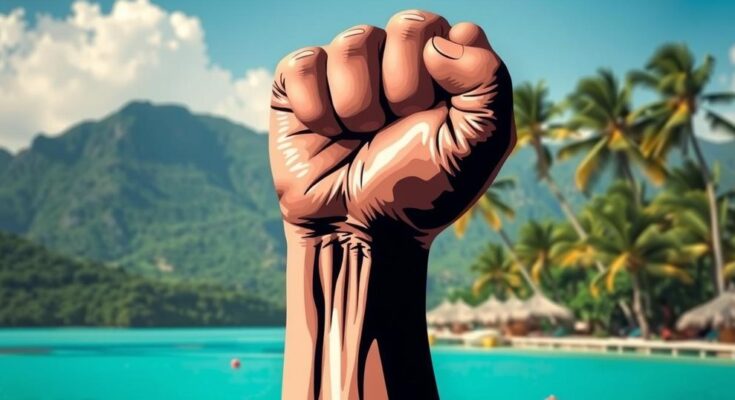The article examines Puerto Rico’s historical resistance to U.S. colonial rule, emphasizing the role of the Nationalist Party and subsequent revolutionary movements. It highlights key uprisings and their impacts, advocating for armed struggle as an essential tactic in the fight for independence. The legacy of these struggles informs contemporary activism against oppression in Puerto Rico and beyond.
The quest for liberation from colonial rule in Puerto Rico highlights the need for armed resistance against imperialist oppression. The historical context reveals the struggles faced by Puerto Ricans under U.S. colonial domination, which began after the Spanish-American War. The Nationalist Party, founded in 1922, was pivotal in promoting nationalism and independence, rallying support against the oppressive policies of the U.S. government.
Led by Pedro Albizu Campos, the Nationalist Party engaged in various protests and armed struggle, facing severe governmental suppression. The enactment of the Gag Law exemplified the lengths to which the U.S. would go to silence dissent, criminalizing the expression of Puerto Rican nationalism. Despite these challenges, the Nationalist Party inspired a series of revolutionary movements across the island, emphasizing the necessity of armed struggle for liberation.
The armed uprisings in Jayuya and Utuado in 1950 marked significant resistance against colonialism, resulting in violent confrontations with police. Further emblematic actions included attempts to assassinate President Harry Truman and attack the U.S. Capitol, reinforcing the determination of Puerto Ricans to combat colonial rule. Despite setbacks, these endeavors sparked subsequent revolutionary groups advocating both nationalism and Marxism-Leninism.
Subsequent organizations such as the Armed Liberation Commandos and the Armed Forces of National Liberation emerged, adopting similar revolutionary fervor. The Armed Liberation Commandos targeted corporate and military entities in Puerto Rico, underscoring their commitment to dismantling capitalist structures while aligning themselves with the working class. Their actions were driven by theoretical support from historical revolutionary leaders, emphasizing the legitimacy of armed struggle against oppression.
The Armed Forces of National Liberation aimed to reinvigorate the fight for Puerto Rican independence, launching campaigns commemorating past uprisings and politically educating the populace. They advocated for coordinated efforts to undermine U.S. influence through strategic strikes and solidarity with the broader movement against oppression. The FALN’s legacy highlights the intertwined nature of armed struggle and political activism in Puerto Rico’s revolutionary history.
Indeed, Puerto Rico’s revolutionary movements embody a profound fight against colonialism, white supremacy, and U.S. nationalism. While armed revolution may not seem immediately viable, historical examples of resistance inspire ongoing struggles for justice. Supporting diverse tactics, including political education and grassroots mobilization, is essential to confronting systemic oppression within Puerto Rico and beyond.
The article discusses the historical and ongoing struggle of Puerto Ricans against U.S. colonialism and imperial aggression. It traces the evolution of resistance through the formation of the Nationalist Party, its armed uprisings, and subsequent revolutionary movements, underscoring the necessity of armed struggle and political education for liberation. By highlighting influential leaders and organizations throughout this history, the text emphasizes the interconnectedness of nationalism and revolutionary ideology in Puerto Rico.
In conclusion, the armed resistance in Puerto Rico has been a crucial aspect of its struggle against colonialism and oppression. The historical initiatives by the Nationalist Party and later revolutionary groups exemplify the enduring pursuit of independence and social justice for Puerto Ricans. This legacy serves as an inspiration for future movements, reinforcing the belief that the fight for liberation involves both armed struggle and concerted political efforts.
Original Source: www.workers.org




